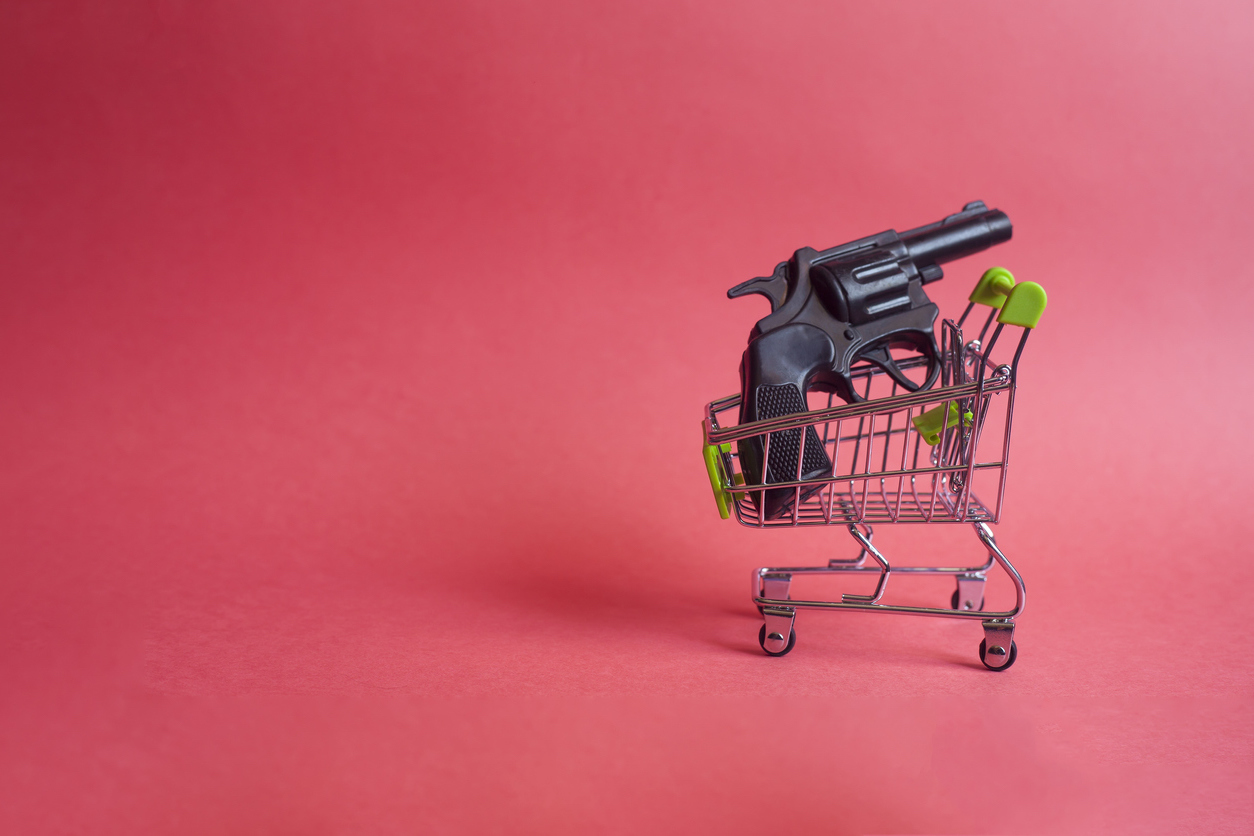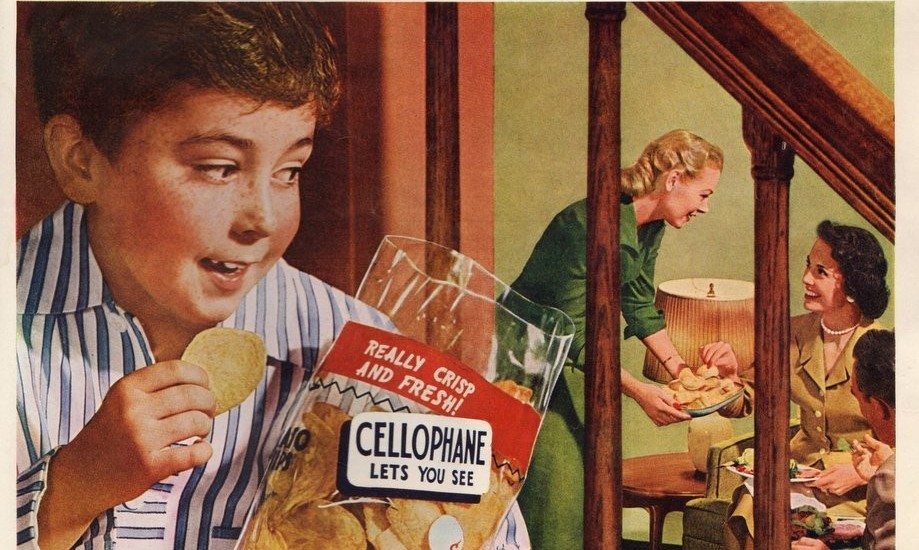
golibtolibov / iStock
Less than a week after the recent mass shooting that left 22 people dead in an El Paso, Texas, Walmart, a pro-gun activist wandered into another Walmart, in Missouri, wearing full body armor. He was carrying an AR-style assault rifle and 100 rounds of ammunition, and had a semi-automatic handgun on his hip. He reportedly told authorities that he was testing whether “his Second Amendment rights would be honored in a public area.” The man, 20-year-old Dmitriy Andreychenko, was surprised that customers seemed upset by his experiment.
To some observers, perhaps less accustomed to encountering fully armed civilians at the supermarket, Andreychenko’s stunt might have seemed beyond brazen. But legally, the licensed gun owner was entirely within his rights: Missouri is an open-carry state, which means you are free to bring your gun just about anywhere without a hassle. “This is Missouri,” Andreychenko reportedly told investigators at the time. “I understand if we were somewhere else like New York or California, people would freak out.”
 AP Photo/Glenwood Springs Post Independent, Christopher Mullen
AP Photo/Glenwood Springs Post Independent, Christopher Mullen Sign on the front door of a Colorado restaurant
It was Missouri, but it was also a Walmart—the nation’s largest supermarket chain, selling $184.2 billion in groceries last year (55% of its annual revenue). The retailer is also a purveyor of guns and ammunition, and, more recently, a retailer that does not want visibly armed customers in its stores. In the wake of El Paso and Andreychenko, two employee deaths from a shooting incident in a Mississippi Walmart, and an armed duel in a Louisiana Walmart, the company made some high-profile changes to its corporate policies last Tuesday. In addition to significantly reducing the types of guns and ammo it sells, the company is “respectfully requesting that customers no longer openly carry firearms into our stores or Sam’s Clubs in states where ‘open carry’ is permitted,” according to a statement from CEO Doug McMillon.
Walmart’s appeal was soon followed by a cascade of other national supermarkets and pharmacies—including Kroger, Wegmans, CVS, Walgreens, and, most recently, Publix, Aldi and Meijer—in implementing no-open-carry policies. But will these policies have any substantive impact on reducing overall gun violence, or on shifting the national dialogue surrounding guns? It’s a fascinating moment for gun control, when corporate decisions in the supermarket sector are outpacing legislative decisions on Capitol Hill.
“We’ve got this impasse at the political level, where our leaders seem paralyzed to pass new gun control laws,” says Shahla Hebets, who runs an advertising and marketing consultancy for large corporations. “I think we’re going to see more and more brands step in to do what our politicians can’t, or won’t.”
🛒🛒🛒
You’re excused if you’ve never seen a sign in a restaurant or grocery store, telling you whether or not your guns are welcome. On a recent visit to Texas, this reporter was bemused to see a sign featured prominently in Whole Foods, informing customers of its strict no-gun policy. Does anyone really need a pistol while they compare prices on organic melons? But for some gun owners, especially those in open-carry states, the answer would be a resounding “yes.”
“Curious if Walmart will now provide armed security at all of its stores now that the company has made clear it doesn’t like individuals who do their duty to carry and do their best to protect themselves. (the answer is obviously no),” wrote conservative commentator Katie Pavlich, on Twitter last week.
Curious if Walmart will now provide armed security at all of its stores now that the company has made clear it doesn’t like individuals who do their duty to carry and do their best to protect themselves. (the answer is obviously no)
— Katie Pavlich (@KatiePavlich) September 3, 2019
Pavlich was echoing a common refrain among 2nd-amendment advocates, that American citizens have a right to defend themselves at all times, whether they’re picking up a case of Nilla wafers at Costco, grabbing a Starbucks latte, or sleeping peacefully in their homes. Policies like Walmart’s, they argue, remove their constitutionally mandated right to self-defense. Further, they claim that spaces without guns can actually invite violence from bad actors. Walmart is now a “soft target,” they say, just like elementary schools.
“Basically you are wearing a neon sign saying, come and get me because I’m a law abiding citizen and I have no way to protect myself,” wrote Twitter user Terri Lynn Bedford.
Because criminals who want to do harm will find a way. Basically you are wearing a neon sign saying, come and get me because I’m a law abiding citizen and I have no way to protect myself.
— Terri Lynn Bedford (@bedford_terri) September 3, 2019
The evidence for this vulnerability being exploited is spotty at best. Take, for instance, the recent El Paso shooting, where there were armed customers present in the store, none of whom were able to stop the shooter. According to Jake Charles, executive director of the Center for Firearms Law at Duke University, the idea that a good guy with a gun will stop a bad guy with a gun is more a matter of faith than a provable assertion. “It’s a classic argument, that criminals will target these vulnerable, gun-free spaces,” he says. “But data surrounding this concept is hard to decipher and easily contested.”
Beyond the practicalities of customer self-defense, Walmart’s corporate decision has also sparked a discussion of values. On one hand, gun safety advocates like Moms Demand—which ramped up pressure on Walmart using the social media hashtag #groceriesnotguns—are celebrating these corporate shifts. On the other hand, some gun owners feel that any anti-gun message from a brand or retailer is indicative of incompatible values.
🛒🛒🛒
Thirty-one states currently allow licensed gun owners to openly carry firearms without a special permit, while 15 others allow permitted citizens to do so. Private businesses are allowed to set their own policies, but that’s not a debate many chains have wanted to engage in.
For a massive retailer like Walmart, there is a certain calculus that goes into decisions like this. Simply: Will the decision drive away customers, or will it be well-received on the whole? “There’s an understandable reluctance to dive into issues this thorny,” says Hebets. “But there comes a point when companies can read the headwinds. For Walmart, that moment is now.”
That’s not to say Walmart’s decision was purely the product of a bottom-line mentality. National polling does show strong support for increased gun control, giving Walmart reasonable assurance that its announcement would be well-received on the whole. But after numerous gun-related incidents on its properties in recent months, the company’s policy changes seem to say something about the temperature of its internal culture. Indeed, Walmart—which did not respond to requests for comment before publication—received pressure from its own employees to consider a change. “When your own staff is telling you they feel unsafe coming in to work, that’s something you listen to,” Hebets says.
Michael Siegal, a professor of community health science at Boston University who has studied gun violence extensively, sees these corporate announcements as largely symbolic in terms of violence reduction. There is little evidence that, for instance, mass shooters would be deterred by a corporate no-guns policy, or “request,” as Walmart frames it. Additionally, it could be argued that pro-gun customers may simply begin concealing their firearms instead of carrying them openly, an outcome that Charles says is “optimal for some 2nd-amendment activists.”
“Even if it is mostly symbolic, it’s a powerful statement,” says Siegal. “This is how social norms are developed. Even if it’s technically legal to walk around with your gun out, Walmart’s decision indicates its social acceptability may be nearing its end. And eventually, a social shift can lead to a political one.”
Walmart is hoping to expedite this political path directly, indicating in last week’s announcement that the company will pressure Congress to pass some gun control legislation. And this may be a harbinger of things to come: On Thursday, 145 corporate CEOs—including those from Beyond Meat, Impossible Foods, and Yelp—sent a letter to the Senate, strongly pushing for expanded background checks and red flag laws.










